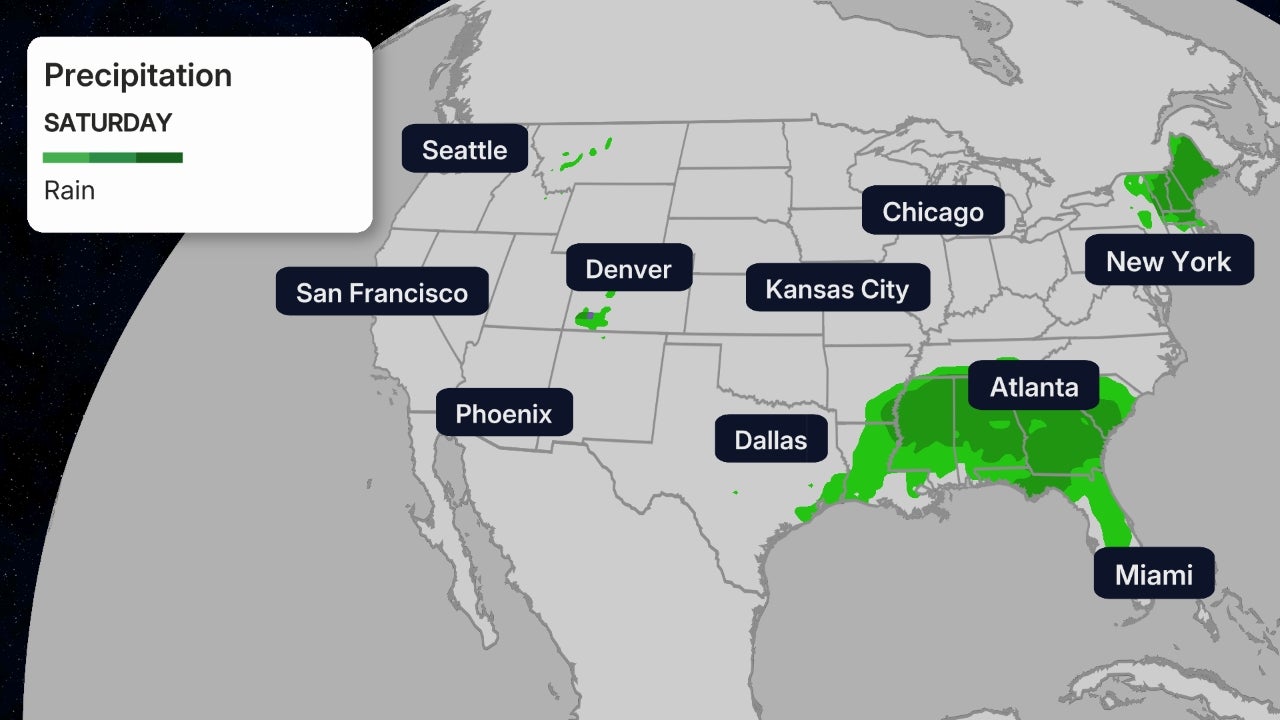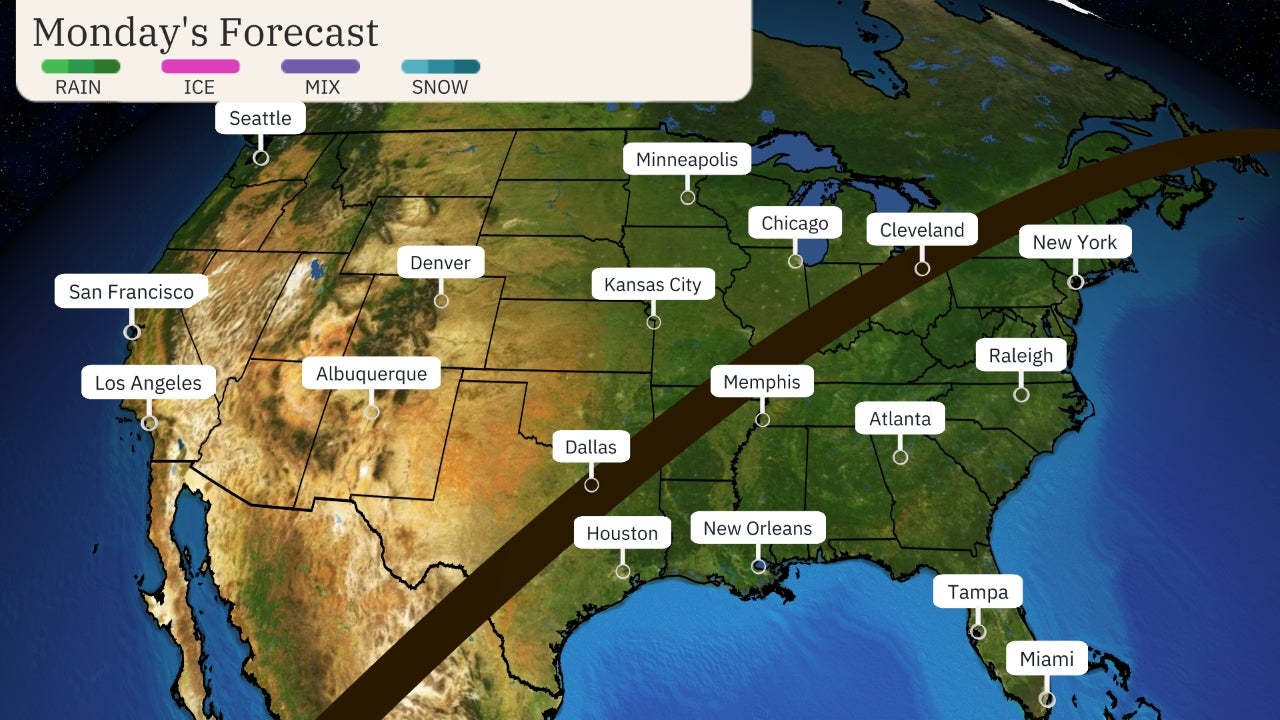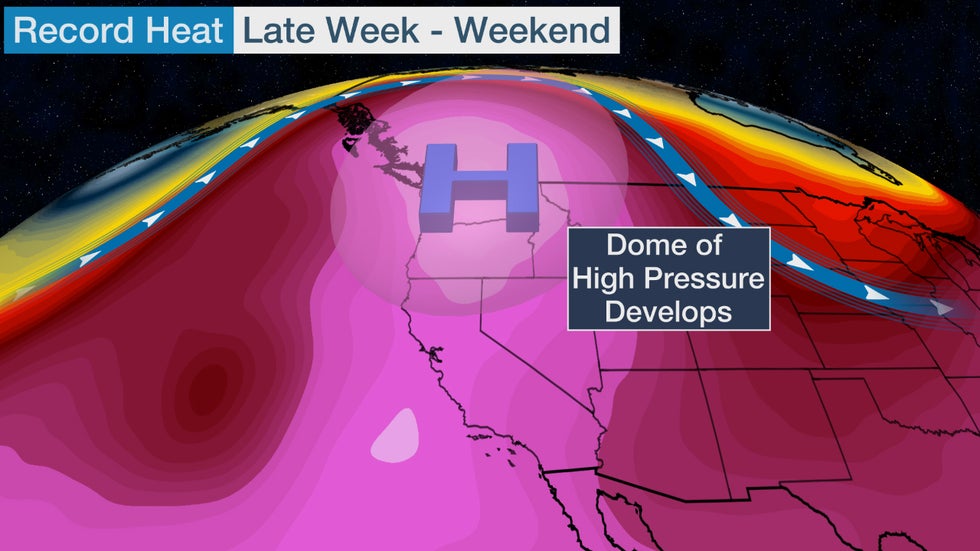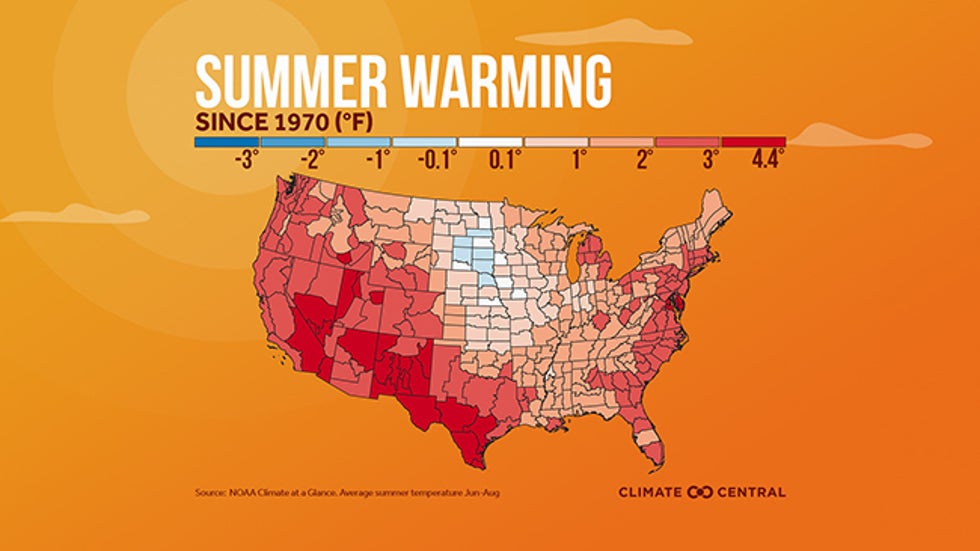weather.com meteorologists
A historic heat wave threatens all-time records in the Northwest this weekend into next week with dangerous triple-digit highs in parts of Washington, Oregon, Idaho, Montana and western Canada.
...UNPRECEDENTED HEAT WAVE EXPECTED THIS WEEKEND INTO NEXT WEEK...
That's the headline today from the National Weather Service in Portland, Oregon.
The office in Spokane, Washington didn't mince words either:
"This event will likely be one of the most extreme and prolonged heat waves in the recorded history of the Inland Northwest. Unprecedented heat will not only threaten the health of residents in the Inland Northwest but will make our region increasingly vulnerable to wildfires and intensify the impacts our ongoing drought."
Excessive heat alerts are in effect across much of the West, from California and Nevada to Washington and Idaho ahead of this dangerous heat wave.
These alerts include Seattle-Tacoma, Portland, Salem and Eugene, Oregon; and Spokane, Washington.

In addition to the alerts due to the heat, fire weather watches have been issued for parts of the Columbia River Gorge into the Cascades due to heightened fire weather concerns this weekend.
While 100-degree-plus heat is common in parts of the West and even interior Northwest in summer, this triple-digit heat is forecast to spread to even typically cooler locations such as western Washington.
What's more, this excessive heat is expected to last for several days, well into next week, a factor that makes heat waves particularly dangerous and life-threatening for those most vulnerable.
(MORE: Heat More Deadly Than Tornadoes, Flooding, Lightning)
Seattle, Portland: All-Time Records?
West of the Cascades in Washington and Oregon, record-breaking heat will arrive Saturday and could linger into Monday, with only a slight cooldown possible starting Tuesday.
Seattle will soar well into the mid or upper 90s Saturday, then could top 100 degrees Sunday and Monday.
Reaching the 100-degree mark is extremely rare in this city bordered by Puget Sound on the west and Lake Washington on the east.
Sea-Tac Airport on the city's south side has only reached triple digits twice since 1945. They could not only threaten their all-time record - 103 degrees set on July 29, 2009 - but they could reach 100 degrees twice in the same heat wave for the first time on record.
Portland, Oregon, will also threaten the city's all-time record of 107 degrees on Sunday, set over a month later in the calendar in early August 1981 and also in late July 1965.
But that's not the whole story, there.
Computer forecast models have consistently suggested Portland could reach an unfathomable 114 degrees on Sunday. That's 7 degrees hotter than the city has ever seen. It's also 15 degrees warmer than the current daily record!
Salem and Eugene, Oregon, could also reach the 110s for the first time in their recorded history. Their all-time records are both 108 degrees.
This is heat more on par with Phoenix or Las Vegas, rather than the typically wetter, cooler Pacific Northwest, where average highs this time of year are in the 70s.
 Forecast Highs for the Coastal Northwest
Forecast Highs for the Coastal NorthwestNighttime won't offer much relief, with morning lows only dropping into the 70s in these cities. The average low this time of year is in the middle 50s.
(MORE: Why Nighttime Temperatures Are Also Dangerous During Heat Waves)
Interior Northwest
Triple-digit highs will settle into eastern Washington and northeast Oregon Saturday. By Sunday, the lowest elevations near the Columbia River will likely top 110 degrees.
Spokane (108 degrees) and Yakima, Washington (110 degrees) are just a couple of many cities that could flirt with their all-time record highs (current record to beat is shown in parentheses).
Heading to the mountains may not offer as much relief as you might think.
According to the NWS, Paradise Ranger Station - 5,400 feet elevation in Mount Rainier National Park - may also flirt with its all-time record high (92 degrees) in this heat wave.
And this heat may last well into next week. Spokane may see triple-digit highs through much of next week, potentially matching their record streak of six straight days of 100-degree-plus highs set in July 1928.
While not necessarily all-time record-smashing, this heat will bulge eastward into Idaho and Montana next week, as well.

Impacts, Safety Tips
The heat will be exceptionally dangerous if proper precautions aren't taken, especially since air conditioning is not as common in portions of the Pacific Northwest.
Only 44% of homes in the Seattle metro area have air conditioning, according to the U.S. Census Bureau’s American Housing Survey.
In Portland, about 79% of housing units have some kind of air conditioning.
The City of Seattle has already released information about the opening of cooling centers ahead of this heat wave.
“This upcoming week, we’re reopening many City facilities for individuals to stay cool, but many of our City’s indoor spaces remain closed or at reduced capacity due to state and local Public Health mandates,” said Seattle Mayor Jenny Durkan in a press release.
The hot conditions will be particularly dangerous for vulnerable groups, such as the sick and the elderly. The National Weather Service (NWS) has useful heat safety tips that can be incorporated into a daily routine when extreme heat sets in:
-Job sites: Stay hydrated and take breaks inside as often as possible.
-Indoors: Check up on the elderly, sick and those without air conditioning.
-In vehicles: Never leave children or pets unattended – look before you lock.
-Outdoors: Limit strenuous activities and find shade. Drink plenty of water and avoid alcohol.
Western Canada
Environment Canada (EC) has issued heat warnings through Tuesday in much of British Columbia, including parts of Vancouver Island, and as far north as the southern Northwest Territories.
Highs in the Vancouver metro area could top soar as high as 38 degrees Celsius (100 degrees Fahrenheit), according to EC.
In the southern Northwest Territories, EC forecasted temperatures as high as 29 degrees Celsius (84 degrees Fahrenheit) through the middle of next week.
As in the U.S., this excessive heat is forecast to spread east into Alberta and Saskatchewan next week, while persisting in British Columbia to a bit less of a degree.
Record Strong Heat Dome For the Northwest, Canada?
The reason behind this record-smashing heat wave is a hot dome of high pressure that will build into the region as the jet stream takes a far-north arcing path into western Canada.
This heat dome may be record strong for this area for this time of year, or any time of year.
Sinking air underneath this high-pressure system will send high temperatures soaring more than 20 or even 30 degrees above average by this weekend and lasting into next week.
The ongoing drought will only worsen the heat wave, allowing the parched ground to heat up more efficiently. This will also push fire danger to exceptional levels.

The Long-Term Trend
Heat waves have occurred as long as there has been weather.
However, as the planet warms, heat waves are expected to become more frequent and intense.
According to the U.S. Global Change Research Program, the number of heat waves in major U.S. cities has increased from an average of two per year in the 1960s to more than six per year in the 2010s.
The USGCRP found the time of year heat waves can occur in 50 U.S. cities is 47 days longer than it was in the 1960s.
Climate change has also caused the more extreme heat waves to be 3 to 5 degrees (Fahrenheit) warmer over most of the U.S., according to a study lead by Michael Wehner of Lawrence Berkeley National Laboratory.
Since 1970, the West - including the Pacific Northwest - has warmed the most in summer, according to a NOAA analysis.
 The long-term change in the average summer temperature in the U.S. from 1970 through 2020.
The long-term change in the average summer temperature in the U.S. from 1970 through 2020.Seattle now averages eight more days of 85-degree-plus heat each year than they did in 1970, according to an analysis from Climate Central.
Similarly, Portland, Oregon, now averages two more days of 95-degree-plus heat each year than 50 years ago.
While long-term climate change doesn't cause a particular weather event such as a flood, hurricane or heat wave, it is likely to have at least some influence on this record-smashing heat wave.
The Weather Company’s primary journalistic mission is to report on breaking weather news, the environment and the importance of science to our lives. This story does not necessarily represent the position of our parent company, IBM.
The Weather Company’s primary journalistic mission is to report on breaking weather news, the environment and the importance of science to our lives. This story does not necessarily represent the position of our parent company, IBM.

No comments:
Post a Comment